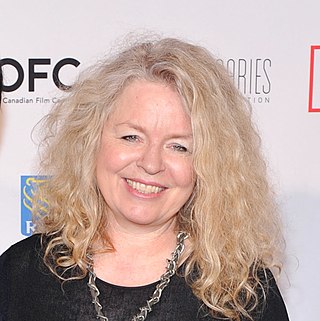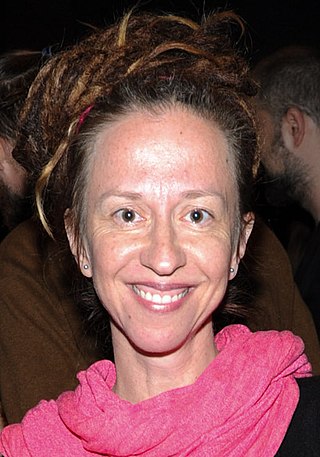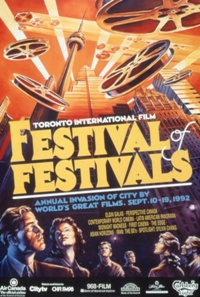Related Research Articles

Atom Egoyan is a Canadian filmmaker. Emerging in the 1980s as part of the Toronto New Wave, he made his career breakthrough with Exotica (1994), a film set in a strip club. Egoyan's most critically acclaimed film is the drama The Sweet Hereafter (1997), for which he received two Academy Award nominations. His biggest commercial success is the erotic thriller Chloe (2009).

Exotica is a 1994 Canadian film written and directed by Atom Egoyan, and starring Bruce Greenwood, Mia Kirshner, Don McKellar, Arsinée Khanjian, and Elias Koteas. Set primarily in the fictional Exotica strip club in Toronto, the film concerns a father grieving over the loss of a child and his obsession with a young stripper. It was inspired by Egoyan's curiosity about the role strip clubs play in sex-obsessed societies. Exotica was filmed in Toronto in 1993.

Bruce McDonald is a Canadian film and television director, writer, and producer. Born in Kingston, Ontario, he rose to prominence in the 1980s as part of the loosely-affiliated Toronto New Wave.

Cinéfest Sudbury International Film Festival, also known as Cinéfest and Cinéfest Sudbury is an annual film festival in Greater Sudbury, Ontario, Canada, held over nine days each September. It is one of the largest film festivals in Canada.

Don McKellar is a Canadian actor, writer, playwright, and filmmaker. He was part of a loosely-affiliated group of filmmakers to emerge from Toronto known as the Toronto New Wave.

Patricia Rozema is a Canadian film director, writer and producer. She was part of a loosely-affiliated group of filmmakers to emerge in 1980s from Toronto known as the Toronto New Wave.
Ronald Mann is a Canadian documentary film director.

I've Heard the Mermaids Singing is a 1987 Canadian comedy-drama film written and directed by Patricia Rozema and starring Sheila McCarthy, Paule Baillargeon, and Ann-Marie MacDonald. It was the first English-language Canadian feature film to win an award at the Cannes Film Festival.

Ingrid Veninger is a Canadian actress, writer, director, producer, and film professor at York University. Veninger began her career in show business as a child actor in commercials and on television; as a teen, she was featured in the CBC series Airwaves (1986–1987) and the CBS series Friday the 13th: The Series (1987–1990). In the 1990s, she branched out into producing, and, in 2003, she founded her own production company, pUNK Films, through which she began to work on her own projects as a writer and director.

Geoff Pevere is a Canadian lecturer, author, broadcaster, teacher, arts and media critic, currently the program director of the Rendezvous With Madness Film Festival in Toronto. He is a former film critic, book columnist and cultural journalist for the Toronto Star, where he worked from 1998 to 2011. His writing has appeared in several newspapers, magazines and arts journals, and he has worked as a broadcaster for both radio and television. He has lectured widely on cultural and media topics, and taught courses at several Canadian universities and colleges. In 2012, he contributed weekly pop culture columns to CBC Radio Syndication, which were heard in nearly twenty markets across Canada. He has also been a movie columnist and regular freelance contributor with The Globe and Mail.
Peter Lynch is a Canadian filmmaker, most noted as the director and writer of the documentary films Project Grizzly, The Herd and Cyberman.
Take One was a Canadian magazine devoted to coverage of both Canadian and international film.

Donald Everett Shebib was a Canadian film and television director. Shebib was a central figure in the development of English Canadian cinema who made several short documentaries for the National Film Board of Canada and CBC Television in the 1960s before turning to feature films, beginning with the influential Goin' Down the Road (1970) and what many call his masterpiece, Between Friends (1973). He soon became frustrated by the bureaucratic process of film funding in Canada and chronic problems with distribution as well as a string of box office disappointments. After Heartaches (1981), he made fewer films for theatrical release and worked more in television.

The Adjuster is a 1991 Canadian drama film directed by Atom Egoyan, his fourth feature film and the first to achieve international acclaim. The film won five awards, as well as two other nominations upon its initial release.

Peter Mettler is a Swiss-Canadian film director and cinematographer. He is best known for his unique, intuitive approach to documentary, evinced by such films as Picture of Light (1994), Gambling, Gods and LSD (2002), and The End of Time (2012). "His peripatetic lens is ever gravitating toward outsiders in search of ecstatic states", writes José Teodoro in Brick, "strange spectacles that defy straightforward documentation, and sacred places that promise some metaphysical deliverance. There are precedents for his methodologies—the films of Chris Marker and Werner Herzog come to mind—but Mettler’s gifts as an open and unobtrusive interviewer and his capacity to discover shared sensibilities between people of vastly diverse cultures and creeds feels singular."
Between Friends is a 1973 Canadian crime film directed by Donald Shebib. It was entered into the 23rd Berlin International Film Festival, and was featured in the Canadian Cinema television series which aired on CBC Television in 1974.
Wyndham Paul Wise is a Canadian film historian, critic, editor and publisher. He was the founder and editor-in-chief of the film magazine Take One: Film & Television in Canada (1992-2006).
The Air Canada enRoute Film Festival was an annual film festival of short films hosted by Air Canada and its in-flight magazine enRoute. Films are shown as in-flight entertainment as well as screened theatrically in Toronto, Montreal and Vancouver.

The 17th Toronto International Film Festival (TIFF) took place in Toronto, Ontario, Canada between September 10 and September 19, 1992. Léolo was selected as the opening film.
Brenda Longfellow is a Canadian filmmaker known for her biographies of female historic figures. Since 2007, Longfellow's focus in her films has been on environmental issues.
References
- ↑ PANEL: Prairie Postmodernists and New Wave Pioneers: 1980s Cinema « WFG :: Reflecting Light
- 1 2 Wise, Wyndham (Summer 1996). "Ontario's New Wave". Take One: Film in Canada. 5 (12): 34.
- 1 2 Pevere, Geoff (Fall 1995). "Middle of Nowhere: Ontario Movies after 1980". Post Script. 15 (1): 10.
- ↑ The Toronto New Wave: Where Are They Now?-Northernstars.ca
- ↑ Pevere, Geoff (5 September 2014). "Canadian filmmakers ride into TIFF without 'training wheels'". The Globe and Mail. Retrieved May 16, 2017.
- ↑ Wise, Wyndham (2001). Take One's Essential Guide to Canadian Film. Toronto: University of Toronto Press. pp. 45–46. ISBN 0-8020-3512-4 . Retrieved March 30, 2017.
- ↑ Wise, Wyndham (Fall 1998). "The Canadian Film Centre at 10: An Interview with Wayne Clarkson". Take One: Film in Canada. 7 (21).
- ↑ Austin-Smith, Brenda & Andrew McIntosh. "I've Heard the Mermaids Singing". The Canadian Encyclopedia. Historica. Retrieved May 16, 2017.
- ↑ "I've Heard Mermaids Singing (1987) - Box Office Mojo". www.boxofficemojo.com. Retrieved 2018-01-04.
- ↑ Morris, Peter, Ted Magder, Piers Handling, Wyndham Wise & Andrew McIntosh. "History of the Canadian Film Industry". The Canadian Encyclopedia. Historica.
{{cite web}}: CS1 maint: multiple names: authors list (link) - ↑ Bailey, Cameron. "Standing in the Kitchen All Night: A Secret History of the Toronto New Wave" . Retrieved May 16, 2017.
- ↑ Pevere, Geoff, ed. (2009). Toronto on Film ("Surfacing the Toronto New Wave: Policy, Paradigm Shifts and Post-Nationalism" by Brenda Longfellow). Toronto: Toronto International Film Festival and the Wilfrid Laurier Press. pp. 109–134.